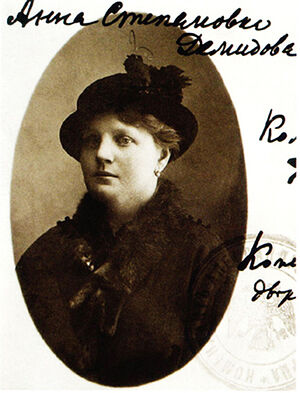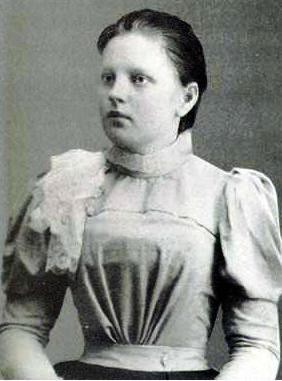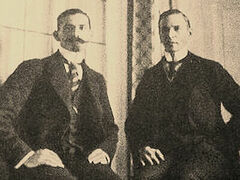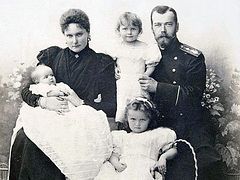Greater love hath no man than this, that a man
lay down his life for his friends.
John 15:13
 Anna Stepanovna Demidova On the night of July 16–17, 1918, the royal servants were executed in the dreadful basement of the Ipatiev House alongside the seven members of the Imperial family. They were the doctor E.S. Botkin, the cook I.M. Kharitonov, the valet A.E. Troup, and the maid A.S. Demidova. These people remained faithful to their duty, honor and oath and courageously went to their deaths demonstrating profound Christian humility and sacrificial love. They made their choice between life and death “for their neighbor,” and this choice became a spiritual labor and an example of loyalty forever.
Anna Stepanovna Demidova On the night of July 16–17, 1918, the royal servants were executed in the dreadful basement of the Ipatiev House alongside the seven members of the Imperial family. They were the doctor E.S. Botkin, the cook I.M. Kharitonov, the valet A.E. Troup, and the maid A.S. Demidova. These people remained faithful to their duty, honor and oath and courageously went to their deaths demonstrating profound Christian humility and sacrificial love. They made their choice between life and death “for their neighbor,” and this choice became a spiritual labor and an example of loyalty forever.
After the abdication of His Majesty the Emperor Nicholas II, almost all of his retinue cowardly abandoned the Imperial Family, shrugging off the oath of loyalty to the Lord’s Anointed they had taken at the time. Favored by power and honors, distinguished noblemen and representatives of elite members of the gentry scattered in all directions. Later followed the house arrest of the Romanovs and their exile in Tobolsk where their servants, who didn’t want to leave the Imperial family in their time of trial, traveled as well. The Empress’s maid Anna Stepanovna Demidova was among them. She followed the Royal Passion-Bearers to Ekaterinburg and died a martyr’s death with them.
They made their choice between life and death “for their neighbor” and this choice became a spiritual labor and an example of loyalty
Anna Stepanovna Demidova was born on January 14/27, 1878 in Cherepovets to the wealthy bourgeois family of Stepan Alexandrovich and Maria Efimovna Demidov. The Demidovs had long been known in their town as devout Christians and generous benefactors. Anna’s great-great-grandfather, Vasily Nikiforovich, funded the opening of the first training school in Cherepovets. Anna’s grandfather, Alexander Andreevich Demidov, was the churchwarden of the Resurrection Cathedral. Her father was a member of the Cherepovets City Duma and the county-level zemstvo assembly of members of the city council, as well as the chairman of the Cherepovets mutual fire insurance society. Anna had two brothers and a younger sister, Elizaveta, who was her best friend.
Anna Demidova (or Nyuta, as she was called by her family) first studied in a two-grade school at St. John the Baptist Leushino Monastery founded by the famous Abbess Thaisia, a spiritual daughter of Righteous John of Kronstadt. Upon graduation from this preparatory school, Anna continued her studies in the six-year teaching school for girls with needlework classes at the same monastery. The education offered there was at the level of a higher educational institution. Abbess Thaisia authored the program of education for girls, which included such subjects as the Law of God, Russian literature, foreign languages, arithmetic, history, natural history, and music. The Leushino schools had developed great programs to teach handicrafts, iconography, and painting. The abbess paid great attention to the development in her students of high moral qualities, such as profound faith, a strong work ethic, commitment to do good, and a sense of responsibility and duty. The decisions Anna made later in her life showed the fruits of this education. Upon graduation with honors from the teacher’s school in 1898, Anna Demidova received a certificate of governess.
Anna’s mastery of needlework played a decisive role in her future. According to family legend, during one of the needlework exhibitions in the Leushino monastery, the Empress took a liking to Anna Demidova’s work, and a skilled embroiderer herself, Alexandra Feodorovna invited the girl to serve at the palace as a maid. On January 13, 1898, the twenty-year-old Anna was “assigned to the rooms of H.I.H. the Empress Alexandra Feodorovna” and received the regular position of “maid of honor of the bedchamber.” For this service, she and her family members were granted nobility by birth.
Anna settled in the Alexander Palace for years to come. A modest, kind, and obliging girl with an even temperament, she quickly fit into the family earning the favor of the Empress and the love of her children. She responsibly fulfilled her duties, the main one being teaching needlework such as sewing, embroidery, and knitting to the Grand Duchesses. She would also occasionally serve as their nanny.
“I’m going to bed now. Nyuta is combing my hair,” Grand Duchess Olga once wrote to her father.
Nyuta grew particularly fond of the Tsar’s youngest daughter Anastasia, since she took part in her upbringing from early childhood
Nyuta Demidova grew very attached to the Royal family and the Grand Duchesses loved her in return. Nyuta was particularly fond of the Tsar’s youngest daughter Anastasia, as she took part in her upbringing from early childhood. Anna’s sister and her family kept a postcard Anastasia had sent to her:
“Congratulations to Mademoiselle Anna! Anastasia. See you soon.”
Nyuta had a fiancé, N. N. Ersberg, an engineer and the brother of Elizabeth Ersberg, a room girl of the Tsar’s daughters. Things were heading toward a wedding, but their union never materialized. Apparently, Anna did not want to part with the Imperial family, knowing that once married, the room girls had to forfeit their position immediately. As an alumna of Leushino Monastery, Anna wrote to her relatives that she accepts her service to the Anointed of God as an obedience and will never leave her position of her own free will. She lovingly told them about the Imperial family. The Emperor himself called her by her first name and patronymic, while the Empress, in her letter to A.A. Vyrubova, said of her: “My nice and big Nyuta Demidova.” The Tsarina’s congratulatory words to Anna have survived till our days:
“I heartily congratulate dear Anna Stepanovna with her Name Day, sending you a big kiss from afar and my best wishes. A.F.”
 Anna Stepanovna Demidova On February 21, 1913, in connection with the celebration of the 300th anniversary of the House of Romanovs, Anna Stepanovna Demidova was awarded among other royal servants with the Light bronze commemorative medal.
Anna Stepanovna Demidova On February 21, 1913, in connection with the celebration of the 300th anniversary of the House of Romanovs, Anna Stepanovna Demidova was awarded among other royal servants with the Light bronze commemorative medal.
Nyuta, who often returned to her native Cherepovets, was greeted with honor by simple folk who loved the Imperial family and respected Anna, the maid of the Empress herself: “They stood along the road from the station to her house” (as related by an old nanny in the house of Anna’s sister, E.S. Demidova).
After the February Revolution of 1917, all the inhabitants of Tsarskoye Selo who did not want to be subjected to the prison-like security, had to leave the palace. Demidova, among a small group of servants, continued to reside in the Alexander Palace. When the question arose of sending the crowned family to England, Anna told her relatives that she wasn’t going to go there, but would return to her native Cherepovets. Apparently, she loved Russia and did not want to leave it. When the family was sent to Tobolsk in August 1917, Anna voluntarily followed them to share the bitterness and burden of exile with her beloved Masters, as she called the Imperial couple. She dreaded her future, but she never entertained any thought of betrayal.
“The last two weeks, ever since I have found out that they have plans to send us “somewhere,” I was on edge and slept little, worrying about the unknown, about where we will be taken,” she wrote in her diary preserved to our days. “It was a time of hardship. It was only when were already on the road that we found out we are being “sent away to the far north” and my heart sinks at the mere thought of ‘Tobolsk’. “
In her diary, she describes their long journey to Siberia. From Anna Demidova’s diary:
“When we travel, I think less of what the future will bring us, but I feel sick in heart once I realize how far I am from my family, whether I will ever see them again or when! I haven’t seen my sister, not even once, for five months.”
Both the Romanovs and their servants lived in exile as one tight-knit family: they prayed, worked, and rested together
The Imperial family considered their life in Tobolsk “quiet and peaceful”. Both the Romanovs and the servants lived in exile as one tight-knit family: together they prayed, just as they ate, worked, and took rest together. Anna writes in her diary about the weather and pastimes: going to church, attending the Liturgy and All-Night Vigils served in the house, and the evenings with the Emperor, Dr. Botkin, and Prince Dolgorukov taking turns reading aloud. She writes how busy she is about the house and that she was giving lessons to Tsesarevich Alexey when his tutors got sick. She would occasionally visit the St. Sophia Cathedral, which houses the relics of St. John of Tobolsk glorified among the saints during the reign of Nicholas II. Since Anna had the right to freely go about the city, she carried out various errands for Alexandra Feodorovna, risking her freedom and even her life. She would secretly take and deliver the letters and parcels from the Empress to her intimate friends. In a letter dated 12/15/1917 to Anna Vyrubova, Alexandra Feodorovna wrote:
“Thank Annushka for the things and write to me with caution. I hope that you will receive our things by the holiday; they were dispatched only yesterday. It is thanks to Annushka who does everything for me together with Volkov.”
And in a letter dated 12/10/1917:
“Of course, we risk sending this package, but I got Annushka to help me... Write to Annushka that you received everything.”
During the last months of imprisonment, the servants were left without salaries; they served the Imperial Family out of loyalty.
Evgeny Kobylinsky, head of security for the Imperial Family in Tobolsk, testified:
“Demidova was about forty-two years old, full, blonde, with a ruddy face, a straight and small nose, blue eyes.”
Sidney Gibbs, an English tutor of the Tsar’s children, with whom Anna was reportedly in love, left a portrait of hers as well:
“A tall, well-built, and full-bodied woman, who, contrary to her physical appearance, was extremely timid of character.”
He recalled how terrified she was during her last evening in Tobolsk:
“I am so afraid of the Bolsheviks, Mr. Gibbs. I don’t know what they can do to us.”
Overcoming her fear, she accompanied the Empress from Tobolsk to Ekaterinburg.
The life of the prisoners in the “House of Special Purpose” passed in an atmosphere of never-ending abuse on the part of rude, insolent, and evil-minded guards. Demidova happened to be the only servant who was allowed to stay with the family, and, during her last fifty-three days with the Romanovs in the Ipatiev House before the execution, she tirelessly served the Empress, washing and mending linen, or stoking the furnace.
From a letter of the Grand Duchess Maria Nikolaevna: “Nyuta is darning stockings. In the morning, we made the bed together...” From the diary of the Empress: “The children and Nyuta darned linen…” “Before dinner, Maria and Nyuta washed my hair.” Anna Stepanovna turned out to be one of the closest people in the entourage of the holy Imperial family during the tragic year of their life.
“I want to kneel before them, as they suffer for us, but we can’t help them, not even with a word,” wrote the Empress
The crowned martyrs were concerned about their faithful servants. Here are some lines from a letter by Alexandra Feodorovna:
“Remember those others. Oh, God, how we suffer for them, what they are going through, the innocent ones... They will receive a crown from the Lord. I want to kneel before them, because they suffer for us, but we cannot help them, not even with a word. This is the hardest of all.”
In July, on the terrible night of the murder of the Imperial family and its faithful servants, Anna was carrying pillows, because the prisoners were told that they would be taken to a safe place. In the basement, Nyuta leaned against the door frame and Anastasia whom she loved so much was standing next to her. In the last moments of their lives, they stood there, side by side—the Grand Duchess and her faithful nanny. A blood curling tragedy unfolded next. When the Bolsheviks began to shoot, the frightened, helpless and horror-stricken woman began to rush about the basement. She used a pillow to defend herself from the bullets that got lodged inside it. When the shots stopped, Anna joyfully exclaimed: “Thank God! God has saved me!”
But her joy over her miraculous rescue didn’t last long... With macabre cruelty, the slaughterers finished her off with bayonets, inflicting thirty-two blows, and then smashed her head with rifle butts. Anna Stepanovna suffered the most dreadful agony. One of the murderers A. Kabanov recalled:
“Frelna1 was lying on the floor still alive... One of the comrades began to poke the Frelna’s chest with the bayonet of the American Winchester rifle. The bayonet was like a dagger, but a blunt one, so it did not pierce the chest. Frelna grasped the bayonet with both hands and began to scream, but then she and three royal dogs were finished with rifle butts.”
The guard A. Strekotin testified:
“Comrade Ermakov, seeing that I was holding a rifle with a bayonet, suggested that I should finish off the survivors. I refused, so he took the rifle from my hands and began to finish them off. It was the most terrifying moment of their death. They couldn’t die for a long time, and so they screamed, moaned, and twitched. That lady had a particularly hard death. Yermakov stabbed all over her chest. His bayonet would hit so hard that it went deep inside the floor every time.”
That’s how that bloody crime happened, which ended the life of Anna Stepanovna Demidova, a remarkable Russian woman who shared with the Imperial family their exile, countless sufferings and ascent to Golgotha.
The Russian Orthodox Church Outside Russia did justice to her deed. In 1981, she was glorified as a saint along with everyone murdered in the basement of the Ipatiev House. Grateful residents of Cherepovets installed a memorial plaque in the memory of Anna Demidova on the house where she spent her childhood and youth. I hope that someday her canonization will take place in Russia, too. We admire her loyalty to God and to the family of the Holy Royal Passion Bearers.




